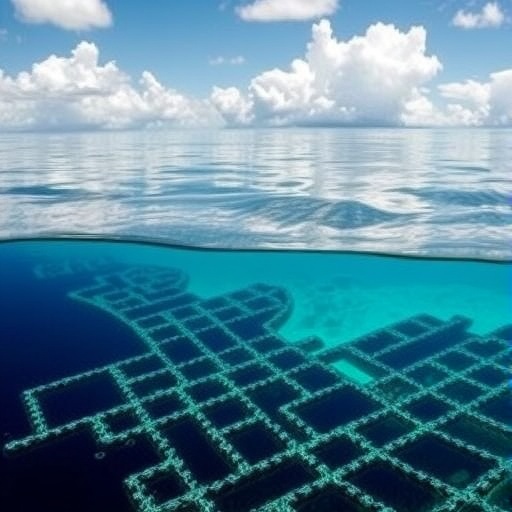As the Earth’s climate warms beyond the critical threshold of 2 °C, the vitality of Atlantic coral reefs faces unprecedented threats, with profound implications for their capacity to grow and buffer rising seas. Recent research reveals a troubling decline in the maximum potential rates of reef vertical accretion, a parameter crucial to the survival of reef ecosystems amid accelerating sea-level rise (SLR). This decline not only jeopardizes reef health but also compromises coastal protection that millions depend on.
Researchers have employed an innovative approach to quantify reef growth potential, known as the maximum vertical accretion rate (RAP_max), which translates in-field carbonate production measurements into estimates of reef-building capacity. This methodology, refined over decades, considers the weight of calcium carbonate produced per square meter annually, then integrates mineral density and an essential factor known as stacking porosity, reflecting the density and framework architecture of coral assemblages.
Stacking porosity, a critical yet often overlooked parameter, accounts for the void spaces between coral skeletons after growth and subsequent biological or physical erosion. The highly variable nature of this porosity, influenced by coral species and their skeletal morphologies, greatly impacts reef accretion estimates. Branching corals, for example, tend to produce frameworks with higher porosity due to fragmented rubble accumulation, whereas massive corals typically form denser, low-porosity frameworks.
Historically, porosity values have been broadly generalized for coral assemblages, often defined by dominant growth forms such as branching versus massive corals. However, this simplification fails to capture fine-scale differences within coral types that significantly affect reef structure and growth potential. Recognizing this limitation, the study zoomed in on fossil coral assemblages from the Tropical Western Atlantic (TWA), analyzing preserved reef exposures from the mid-Holocene and Quaternary interglacial periods.
Through a meticulous image-based quantitative analysis, the team examined 66 high-quality photographic exposures of ancient reef frameworks, spanning diverse depositional settings and wave exposures. By delineating coral skeletal components and applying advanced imaging tools like Adobe Illustrator, Photoshop, and ImageJ, they derived coral-assemblage-specific porosity values with remarkable precision. These values represent the proportion of void space within reef frameworks attributable to particular coral species assemblages, refining previous broad estimates.
The researchers identified seven distinct coral species-morphotype assemblages common to the TWA shallow-water reefs, including prominent branching corals like Acropora palmata and Acropora cervicornis, as well as massive and mixed coral types. Each assemblage displayed unique porosity characteristics, highlighting interspecies variation in skeletal geometry and post-mortem structural integrity. Notably, these refined porosity metrics provide more accurate inputs for transforming carbonate production data into reef growth rates.
Applying these newly determined porosity values to previously established carbonate budget datasets across the TWA, including regions such as the Florida Keys, Mexican Mesoamerican Reef, Gulf of Mexico, and Bonaire, the study recalculated RAP_max values. This reanalysis uncovered significant deviations from earlier growth estimates, underscoring the importance of species-specific porosity factors. The recalculated growth rates exhibited a strong dependence on coral cover and assemblage composition, with declines in key branching coral species correlating with diminished accretion potential.
Beyond assessing present-day growth capacities, the research projected future scenarios for reef accretion under sea-level rise influenced by varying climate pathways, labeled Shared Socioeconomic Pathways (SSPs) ranging from low to high emissions. Integrating climate model outputs from CMIP6 with laboratory-derived responses of coral and coralline algal calcification and bioerosion dynamics to ocean acidification and warming, the team modeled how these factors will simultaneously constrain reef growth.
These projections revealed an alarming trend: as ocean temperatures rise and acidification intensifies, calcification rates decline, and skeletal bioerosion accelerates, collectively reducing the ability of reefs to build up vertically at rates matching or exceeding projected SLR. Notably, external bioerosion from fish and urchins was held constant due to data limitations, possibly underestimating overall erosion impacts. Coral cover declines due to thermal stress were incorporated based on degree-heating week metrics, further refining temporal projections.
The interplay of species composition, environmental stressors, and complex biological processes culminates in a stark forecast. By mid-century and beyond, many TWA reefs will struggle to keep pace with rising sea levels, jeopardizing their role as natural breakwaters and biodiversity hotspots. These findings signal urgent need for conservation strategies that consider both biological community structure and climate mitigation to preserve reef functions.
This work represents a significant advancement in coral reef science, coupling detailed paleoecological reconstructions with cutting-edge imaging and climate modeling to provide a nuanced understanding of reef growth dynamics under climate change. By acknowledging species-specific structural traits and integrating multifaceted stress responses, the research sets a new standard for projecting coral reef futures.
While the study focuses on the Tropical Western Atlantic region, the methodologies and insights generated hold implications for coral assemblages worldwide, especially those facing similar threats from global warming and ocean chemistry shifts. Future research expanding this framework to other biogeographic regions will be instrumental in formulating comprehensive global reef conservation strategies.
Ultimately, this body of work elevates the conversation around coral reef resilience, emphasizing the delicate balance between biological community composition, environmental conditions, and geomorphic processes. It highlights that preserving coral species richness and structural diversity is as critical as addressing global carbon emissions in safeguarding reefs against the inexorable rise of the seas.
Subject of Research: Coral reef accretion potential and impacts of climate change on reef growth under sea-level rise scenarios.
Article Title: Reduced Atlantic reef growth past 2 °C warming amplifies sea-level impacts.
Article References:
Perry, C.T., de Bakker, D.M., Webb, A.E. et al. Reduced Atlantic reef growth past 2 °C warming amplifies sea-level impacts. Nature (2025). https://doi.org/10.1038/s41586-025-09439-4
Image Credits: AI Generated
Tags: Atlantic coral reef declinebiological erosion of coral skeletonscarbonate production estimatesclimate threshold effects on reefscoastal protection ecosystemscoral reef biodiversity and resiliencecoral species impact on reefsinnovative coral growth measurementmaximum vertical accretion ratereef health and climate changesea level rise implicationsstacking porosity in corals





